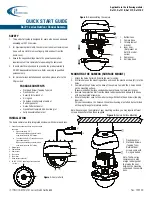
20
|
Using Rear- or Second-Curtain Synchronization
Using Rear- or Second-Curtain Synchronization
When you photograph a moving subject with a slow (1/30 second or longer) shutter speed and a flash, the
flash will freeze the moving subject and the long exposure will cause motion blur and light trails to appear in
the image, especially in low light. This “slow-sync” flash technique, also referred to as “dragging the shutter,”
can be applied in two different ways: The flash can be synchronized with the camera’s shutter release so that
it fires at the beginning of the period when the shutter opens, or it can fire near the end of that period. The
former is called “front-curtain” or “first-curtain” flash sync, and the latter is called “rear-curtain” or “second-
curtain” sync. Front-curtain sync causes motion blur and light trails to appear in front of moving subjects,
while rear-curtain sync makes them appear behind moving subjects. That means rear-curtain sync creates a
more realistic impression of movement.
The VS-260SMI supports rear-curtain sync modes on cameras that offer the setting. Consult your camera’s
manual to find out how to activate it. Use your camera’s manual or shutter-priority mode to control the amount
of blurring and light trails you capture by varying the shutter speed.





































